Startups Shine at Newark Venture Partners Demo Day “Main Event” — Part Two
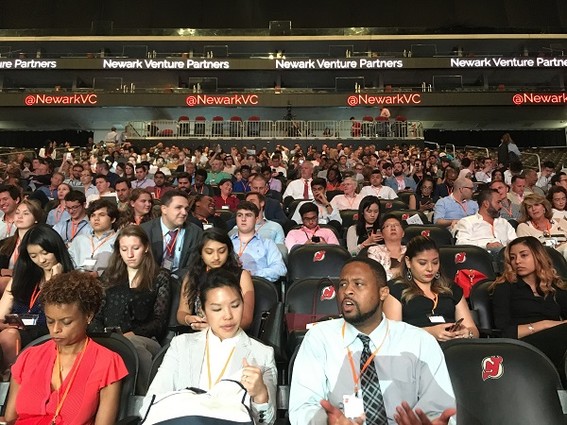
Newark Venture Partner Labs held its Demo Day for its second cohort on June 27. In this article, we cover the startups that presented in the second half of that day. The article on the startups that presented earlier in the day can be found here.
The important thing to remember is that these startups accelerated their companies in Newark, and it is the hope of the founders of Newark Venture Partners that the companies will stay in the city, grow, create jobs, and bring business visitors to Newark.
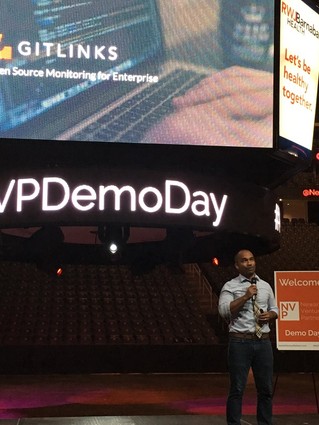
GitLinks: According to NVP managing partner Tom Wisniewski, Ian Folau, cofounder and CEO of GitLinks (New York), came to NVP Labs by way of Frankfurt, Germany, and the U.S. Army. Folau pitched for his company, which is a startup that “monitors open source code for enterprises.”
GitLinks solves a very real problem with software development. Open source code is “the fundamental building block of the way we build digital products today,” Folau said. “Developers go on public websites and find code to recycle, cutting weeks, if not months, of development time. In fact, 96 percent of our commercial applications today depend on open source.”
Folau said that 60 percent of the sites that use open-source software have inadvertently incorporated a critical security vulnerability. Also troubling is the fact that 85 percent of applications “have a restrictive license that can lead a company to get sued.” It’s very hard for managers to manually track the open source code that developers are using, he added.
GitLinks automates the management of open-source software, plugging into the testing and build environment of a company’s developers. It detects open-source components each time new code is added. The components are tested against a database where “we actively track all known security vulnerabilities, latest software versions, and licenses of all open-source” components. The system alerts managers “who currently have no oversight of these issues, so they can track their risks.”
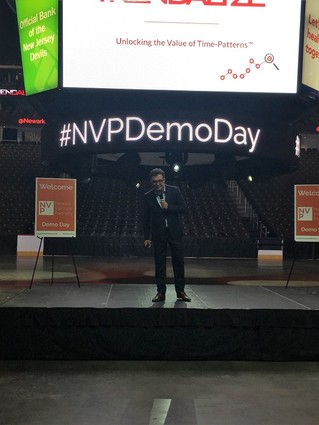
Trendalyze: Rado Kotorov, who came to NVP Labs from Sofia, Bulgaria, pitched Trendalyze (Newark). “The mission of Trendalyze is simple: We want to help enterprises to up the value in their time-sensitive data,” said Kotorov, who is a cofounder of Trandalyze and chairman of the board.
Comparing his product to Google, Kotorov said that his startup had invented the search for “time patterns,” which he called “motifs.” Finding these patterns “helps us control and understand the billions of smart devices” that exist today. “If you can search and monitor for repeating patterns, motifs, if you can predict the next recurring pattern, you actually can stop a machine before it fails.
“Today, smart factories, smart cities and smart devices in healthcare and other industries imbed sensors, and these sensors collect very granular data in seconds and milliseconds. This data is being analyzed to discover patterns. But, most importantly, if we can monitor for those patterns, for their occurrence, we can create cost savings or capitalize on other opportunities or beneficial outcomes,” Kotorov said. He added that there are no such capabilities in current business intelligence and analytics platforms, but the startup has made it very easy for professionals to work with time-sensitive data by providing interactive visualization tools.
Trendalyze expects 60 percent of its sales to come from system integrators who manage smart products for enterprises. “We built the technology over the last two years, and we launched a general enterprise-grade platform two months ago. And we have four paying customers,” he said.
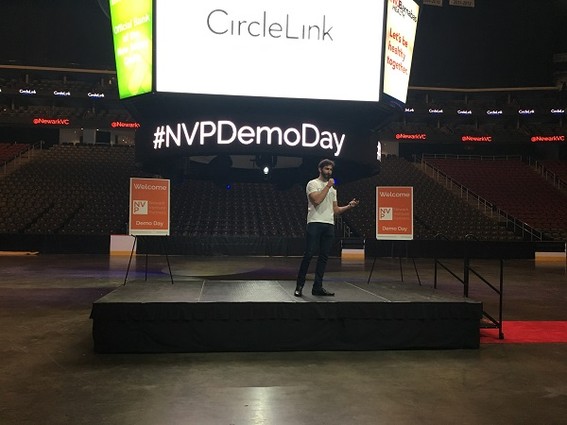
CircleLink Health: Raphael Anstey spoke about CircleLink Health (Stamford, Conn.), a startup that connects nurses by telephone to patients with chronic conditions, so they can provide them with preventative care between doctor’s visits. Anstey, who is a cofounder and the CEO of CircleLink, said that the platform improves health while increasing provider revenue. This platform for chronic-illness telephone coaching follows the trend away from “status quo reactive care” and towards preventative care. CircleLink currently has 30 customers.
The average patient only gets fifteen minutes with a doctor every few months, Anstey explained. “When you have five to 15 medications and multiple conditions, a personal brochure to take home is not really going to help you understand what’s needed to stay healthy.” The good news is that new Medicare rules incentivize doctors to reach out between visits and get paid for it. The problem is that they generally don’t have the “time or the infrastructure to meet what’s required to get paid.
“What we do is connect work-at-home nurses to older folks who have multiple chronic conditions. The nurses can do that coordination and follow-up on behalf of doctors, so doctors can have a better connection with their patients and increase revenue for their practices.” CircleLink “takes data from the doctor’s own records. We figure out who is eligible, and then we can enroll those patients with our own care ambassadors.” The platform also takes a look at the data and makes plans that are customized for each patient. The nurses then take over the coaching and follow-up.
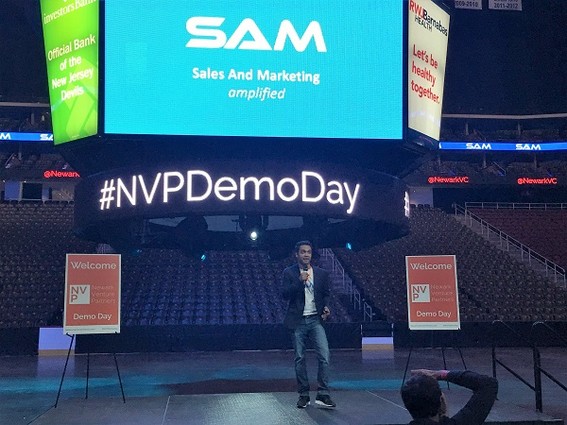
SAM.AI: SAM.AI, from Astoria, Queens, was presented by Raz Choudhury, cofounder and CEO. “SAM is a fully integrated sales and marketing platform. Today there are 5,000 different sales and marketing tools out there. In fact, a company has to use 16 different tools to run their sales and marketing. How can you possibly be productive when you have to use 16 different tools?” he asked rhetorically. “We built SAM from the ground up to solve this problem. SAM is the first fully integrated sales and marketing platform powered by AI,” Choudhury claimed.
The all-in-one platform lets a “person pull up their customer, lead or prospect and know everything — from the last time they visited your website to how many email marketing messages they’ve opened, to their personal data, like what this person really looks like … some of the topics they talk about on social media. This helps a sales person have a much better conversation with their customers. It also allows marketing folks to be able to target their customers much better with our marketing automation tools.”
SAM is based on an expert AI system that can tell salespeople “exactly what time” to call a customer. It can tell a chief marketing officer what’s going to happen with his or her site traffic and lead acquisition months in advance, Choudhury claimed. To date, SAM.AI has secured $100,000 in monthly recurring revenue without adding any sales staff, he said.
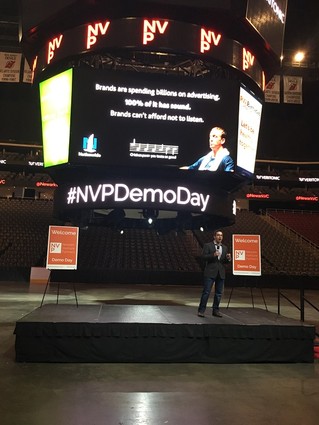
Veritonic: Up last was Scott Simonelli, founder and CEO of Veritonic (Killingworth, Conn.), a company that searches for the right music for use in advertisements, employing machine learning and predictive analytics.
“In the world of advertising, when the music and the voice fit an ad, that ad is 96 percent more likely to be remembered. And people are 24 percent more likely to purchase that product,” he said. Veritonic is “right at that intersection between market research and sound. Brands are spending billions on advertising. One hundred percent of it has sound. With all that time, energy and money being spent, they can’t afford not to listen.”
One of the challenges for advertisers is that finding the right sound is difficult. “It can be an overwhelming sea of possibilities, from millions of pieces of stock audio that sound virtually the same to voice-over artists online. There are male and female voices and all kinds of different characters.” This crippling decision-making process is often exacerbated because choosing can be a real fight. People are passionate about music and sound, and “we’ve seen people dive across conference room tables.” And quantifying the value of a decision is also difficult.
Marketers start with their audience. For example, a marketer might say “I want to target women aged 40, in New York, who have two children and who are in the market to buy a car. And I’d like to make them feel inspired.” The platform matches that goal with a sound, and lets clients test an A version against a B version of the ad and benchmark historical data, he said.
The method uses pane-based data from “real humans” combined with “machine learning and a predictive algorithm” to make sure the data is up to the startup’s “high standards.” Simonelli, who said that he is a professional composer with a tech background, said that the company has grown quarter over quarter over the last 18 months, exceeding $150,000 in the first quarter of 2017.

